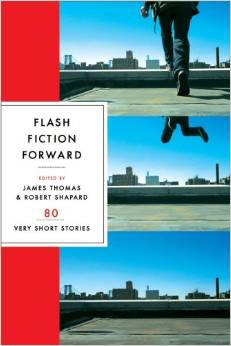I suspect that many of you are not only readers of flash fiction, but also writers. And if you’re like me, you had an epiphany somewhere along the way, something along the lines of, “I can do this? This is allowed?” From the first time I laid pen to paper with the intention of writing a story, I’ve always written flash fiction. But for many years, I thought of these things I’d written as bastard children of literature, nothing publishable. Sure, there were the occasional exceptions, like Stuart Dybek’s “Bottlecaps” nestled in among more traditional short stories in his collection, “The Coast of Chicago.” Or all of Vonnegut’s “Welcome to the Monkey House.” But these seemed like rare exceptions that proved the rule that extremely short fiction just wasn’t acceptable.
I remember distinctly the first book that I read that made my eyes open wider, that made me feel like something more than a freak for writing this stuff. For me, it was W. P. Kinsella’s “The Alligator Report” (which, perhaps tellingly, is now out of print). He introduced his extremely short stories as “Brautigans,” a reference to Richard Brautigan’s “Trout Fishing in America.” I devoured both, and began writing and reading more feverishly than I had in years. Inevitably, this led me to a series of books that probably served as the “epiphany” books for numerous writers of flash fiction, W. W. Norton’s Flash Fiction and Sudden Fiction series, edited by Robert Shapard and James Thomas. Where Vonnegut, Kinsella, and Brautigan proved to me that occasional writers could get published in this form, these books ripped the world open and proved that scores of great writers were writing masterpieces at the length that fit my muse best. What a revelation!
So when Robert Shapard contacted us about a year and a half ago to let us know that new books in the series were in the works, I nearly wet myself. When Robbie and James gave the green light for us to contact the authors of Flash Fiction Forward to assemble a special issue of SLQ, I similarly had the urge to strap on the Dependz.
In their introduction to Flash Fiction Forward, James and Robbie refer to the size of flash fiction beyond its word count. What is the size of its subject? They quote Richard Bausch: “When a story is compressed so much, the matter of it tends to require more size: that is, in order to make it work in so small a space its true subject must be proportionately larger.” Amen. While flashes often offer up slices of life that seem very small, they are illustrative of much larger truths, and they tend to resonate in readers’ minds far beyond the limited number of words on the page. Flash fiction, it has become clear, is not the bastard child of literature, or if it is, it is Shakespeare’s Edmund: I grow; I prosper: Now, gods, stand up for bastards!
What you see before you now is the result of conversations with Robbie and many gracious gifts from the writers to you. Flash Fiction Forward contains 80 flashes by 80 great writers. 24 of those writers appear in this supersized issue of SLQ. A 25th flash to bring it to a nice round number was contributed by Robbie. I am so grateful to Robbie, James, and all of the writers herein for their talent and for their generosity. Compiling this issue has been a joy, not just in reading the works we publish here, but in reading the works of these same authors in Flash Fiction Forward. Flipping between Melanie Rae Thon’s “Translation” and “Blind Fish,” Kit Coyne Irwin’s “Carrots and Plum Blossoms” and “Parrot Talk,” Tom Hazuka’s “Utilitarianism” and “I Didn’t Do That” … these are but a few of these pleasures. To enjoy this issue to its fullest, I urge you to pick up Flash Fiction Forward so that you can flip back and forth the same way. You’ll be glad you did.
Forward!
Dave Clapper
Founding Editor, SmokeLong Quarterly
September 15, 2006


 The core workshop of SmokeLong Fitness is all in writing, so you can take part from anywhere at anytime. We are excited about creating a supportive, consistent and structured environment for flash writers to work on their craft in a community. We are thrilled and proud to say that our workshop participants have won, placed, or been listed in every major flash competition. Community works.
The core workshop of SmokeLong Fitness is all in writing, so you can take part from anywhere at anytime. We are excited about creating a supportive, consistent and structured environment for flash writers to work on their craft in a community. We are thrilled and proud to say that our workshop participants have won, placed, or been listed in every major flash competition. Community works.